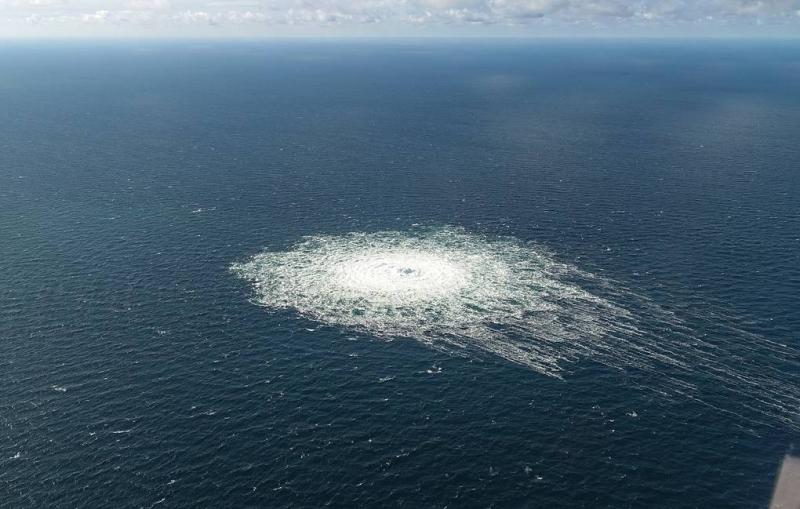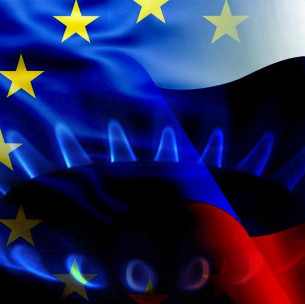
© EPA-EFE/Danish Defence Command/TASS
Top stories from the Russian press on Wednesday, September 28th, prepared by TASS
Media: Donbass republics, Kherson and Zaporozhye Regions vote to join Russia
The referendums on joining Russia ended with positive results in the Donetsk and Lugansk People’s Republics, and the Kherson and Zaporozhye regions. The majority of their population voted in favor of the move, Vedomosti writes.
In Russia, most people support the entry of the new territories. "Over 70% of those surveyed are ready to support their accession," All-Russia Public Opinion Research Center Director General Valery Fyodorov told the paper. "It’s even higher than support for the special military operation, which has remained at about 70%," he added.
As for the international recognition of the plebiscites, Russian International Affairs Council Director General Andrey Kortunov told Izvestia that "there is the precedent of Crimea’s accession, which, as we all know, almost no one recognized, including Russia’s partners in the CIS, China and the vast majority of nations in the global South." "The sanctions that will be imposed on these territories and their population are crucial. Another important thing is that after the areas join Russia, the possibility of political dialogue with Kiev will be hard to imagine. Clearly, the Ukrainian authorities will be reluctant to hold peace talks with Russia on such terms as it would be tantamount to political suicide. These are the consequences that Moscow will have to take into account," the expert added.
"The main goal of the referendums is to assure the people that Russia will protect these territories and they will not change hands," Leading Researcher at the Russian Academy of Sciences’ Institute of World Economy and International Relations Dmitry Trenin noted. "It is the military’s job to fix the line of contact, it’s not done through political measures. The military will be far more motivated to defend the sovereign territory of Russia than some Ukrainian region that Russia controls," the analyst emphasized.
Izvestia: Russia, US engage in preparations for meeting on New START
Russia and the United States are gearing up for a meeting of their delegations that will discuss the resumption of inspections under the Strategic Arms Reduction Treaty (New START), Izvestia writes, citing informed Russian sources. The sources confirmed that Moscow and Washington maintained dialogue on strategic stability issues and were currently discussing a place to hold talks.
Federation Council Deputy Speaker Konstantin Kosachev pointed out that "nuclear stability issues are paramount, they stand above all current situations." "This is why I am deeply convinced that this kind of dialogue needs to be maintained under any and all circumstances," the senator noted.
"Russia (just like the Soviet Union) and the US have always sought to separate arms control issues from the general political situation," Senior Researcher at the Vienna Center for Disarmament and Nonproliferation Nikolay Sokov stressed. According to him, it also concerns the resumption of inspections. "Both parties are expressing interest in that so it’s likely to happen. However, given the present situation, technical issues turn into political ones so it’s hard to predict anything, particularly because the details are unknown," the expert added.
Director of the Franklin D. Roosevelt Foundation for United States Studies at Moscow State University Yury Rogulev emphasized that the inspections had been suspended for political reasons and the issue had not been politicized. "If the mechanism of issuing visas to pilots and ensuring aircraft flights is established, then the inspections will be resumed," the commentator explained. As for the location for the talks, Switzerland or Austria can host them because the two countries maintain military neutrality, the expert noted. However, it should not be confused with political neutrality, which both nations have recently almost lost after taking sides in the Ukrainian conflict.
Media: Sabotage at European infrastructure opens Pandora’s Box
Western politicians’ silence on the explosions that hit European infrastructure facilities mean that the conflict will escalate and the Ukrainian crisis will expand to the EU. It also raises the risk of the destruction of industrial infrastructure and a disruption of export supplies, Nezavisimaya Gazeta notes.
"Instead of reducing Russia’s revenues, the sabotage could have been aimed at increasing the revenues of some other country. A reduction in Russian gas supplies will mostly benefit the United States who has long been trying to drive Russian gas from the European market and impose its own gas supplies on the continent. US gas producers and exporters are making money from high gas prices," Strategic Research Expert at Total Research Nikolay Vavilov pointed out.
The Nord Stream 2 gas pipeline was never launched and Nord Stream 1 was operating at 22% of its capacity due to issues with gas turbine engines subjected to EU, US and Canadian sanctions. This is why the incident will not have a direct impact on the market right now, deputy chief of Russia’s National Energy Security Fund Alexey Grivach told Rossiyskaya Gazeta. However, it will dramatically worsen the situation on the European Union’s market in the medium term because now the EU won’t be able to get Russian gas through Nord Stream even in theory. Those behind the incident sought to deprive the Europeans of the mere opportunity to settle the issue with Russia at a critical time and stabilize energy supplies to the market, the expert noted.
According to Kirill Rodionov from the Institute for the Development of Technologies in the Fuel and Energy Complex, neither Europe nor Russia will benefit from the suspension of gas supplies through Nord Stream 1. EU countries already are on the verge of an industrial recession. As for Russia, the crucial damage will come from the loss of the country’s share on the European gas market. That said, it is highly likely to be about politics rather than about the economy.
In theory, it is the owner and the project operator that should carry out repairs, Grivach explains. However, the activities of the Nord Stream 2 pipeline’s operator are almost completely blocked by Washington’s sanctions. The company has neither the personnel nor the resources to examine and repair the gas pipeline.
Izvestia: Oil prices may soon rise to $100 per barrel again
Oil prices may soon start rising again, reaching the $100 per barrel level, said experts interviewed by Izvestia. The reasons include the decision by OPEC+ to cut output, rising energy consumption in China and a reduction in the amount of oil released from US reserves.
Oil prices are on a decline for the third consecutive month and in terms of technical factors and market logic, it’s time prices begin to increase, said Leading Analyst at Freedom Finance Global Natalya Milchakova. "Fundamental factors may be expected to turn towards growth in early October because OPEC+ will stop raising oil production and will once again cut output," the analyst noted.
"The activities of OPEC+ are a truly powerful factor that may push up oil prices from the current level," Finam Analyst Alexander Potavin points out. "Brent crude price currently remains below $90 per barrel and the group may well be expected to make a move to reduce oil supplies to the market. OPEC+ nations already cut daily oil output by 50,000 barrels in August compared to June," Potavin specified.
Another factor that can contribute to a rise in oil prices in the coming months is a possible increase in the consumption of oil and petroleum products in China, Deputy Director General of the National Energy Institute Alexander Frolov said. It may happen if China eases coronavirus restrictions, he added. Besides, if the West introduces a price cap on Russian oil, it will damage energy supplies to the global market, leading to a rise in oil prices, BitRiver Financial Analyst Vladislav Antonov emphasized.
Rossiyskaya Gazeta: Apple forcing Russian users to move to Androids
Apple has removed a number of applications belonging to the VK holding from AppStore, including the VKontakte app of Russia’s most popular social network. It’s unlikely to affect the operation of the already downloaded apps but users won’t be able to update or reinstall them. Experts expect Apple’s move to boost Russians’ migration to Android.
Deputy head of the State Duma Committee on Information Policy Anton Gorelkin believes that Apple is bent on creating the most uncomfortable situation for Russians. "No matter what the formal reason behind the removal (and Apple is highly likely to cite sanctions) might be, we realize that the main goal is to cause the most discomfort to Russian iPhone users. The information war is not just about fake news, it’s also about this kind of pressure that involves tech monopolies," the lawmaker noted.
Experts agree that the Apple ecosystem will suffer the most in the current situation as it loses its value for Russian nationals with each such move. "As for users, they will, willingly or unwillingly, slowly move to Android smartphones so the popularity of the iOS system in Russia will keep declining. The platform is attractive for advertisers but they are just being forced to move to Android," Mobile Research Group Leading Analyst Eldar Murtazin stressed.
Market experts believe that as a result, the attractiveness of Apple devices will fade away because they no longer support the majority of the most popular services in Russia. "It’s possible to bring Apple gadgets to Russia through the parallel import scheme. But it remains to be seen who needs them now," one of the market players said.









